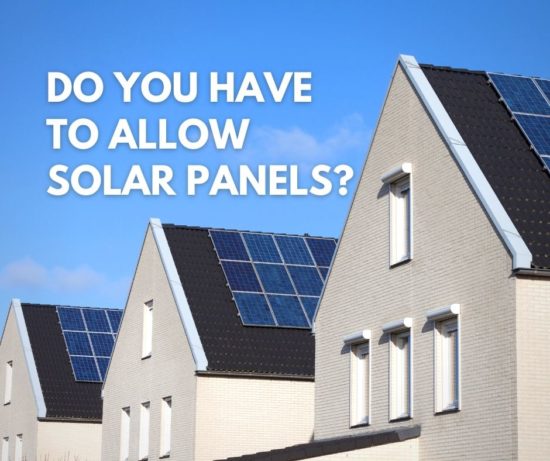
Pursuant to the Colorado Titles and Interest Statute associations cannot prohibit or otherwise place unreasonable restrictions on the installation of solar panels on owners’ properties. Keep in mind that solar panels are not protected on general or limited common elements, so if you serve on a board of directors of a condominium community, this prohibition may not apply to your association. However, planned developments such as single family and townhome communities would be subject to this law.
Notwithstanding the above, associations may place “reasonable” restrictions on the installation of solar panels that pertain to aesthetics and safety concerns. A “reasonable” restriction is defined as a restriction that does not significantly increase the cost of the device or significantly decrease its performance or efficiency.
It is also important to be aware of the additional parameters set forth in HB 1229 with respect to solar panels as we expect the bill to pass in its current form. Specifically, HB-1229 proposes to amend the Titles and Interest Statute by clarifying the word “significantly” to mean more than 10%. In other words, any rule that increases the cost of the device by more than 10% will not be reasonable. Any rule that decreases performance by more than 10% will not be reasonable.
If your community currently regulates or wishes to start regulating, solar panels, below are some key points to doing it right:
- Check your governing documents. Do your governing documents contain restrictions or requirements with respect to solar panels? If so, and assuming they are “reasonable”, the board must utilize such criteria. But keep in mind, if your documents prohibit solar panels altogether, such prohibition cannot be enforced.
- Adopt “reasonable” restrictions. Remember, a rule is reasonable if it does not increase cost or decrease efficiency of the solar panels by more than 10%. Below are some key points to keep in mind when drafting rules for solar panels:
- Make sure the rules do not effectively prohibit the solar panels. For example, if the association prohibits solar panels from being placed on roofs and requires them on the ground, this could effectively prevent owners from installing solar panels and would be an unlawful and unenforceable rule;
- It is reasonable for the rules to specify preferred locations of solar panels (as opposed to requiring specific locations);
- It may be reasonable to require the solar panels or supports to be painted or to otherwise be screened from view;
- It may be reasonable to limit the total roof space that may be utilized for solar panels or to provide a preferred distance for solar panels above the roof tiles.
- Timing for approval/denial. Keep in mind that HB 1229 seeks to require all approvals and denials to be provided within 60 days of submission of the request. If an application for installation of solar panels is not responded to (one way or the other) within 60 days of submission, it will be deemed approved. Furthermore, if installation of a solar panel is denied, the basis for denial must be described in “reasonable detail”.
- Create solar panel installation agreement. Once you have adopted rules or guidelines with respect to solar panels, create a solar panel installation agreement to be signed by the owner who wishes to install solar panels. The installation agreement should address situation such as the removal of solar panels by owner if roof maintenance is necessary (if association maintains the roofs) as well as a requirement for owner to maintain and insure the solar panels. Other items may be addressed in the agreement such as conditions of installation and what happens if the owner breaches the agreement.
Please contact an Altitude attorney if you have questions about solar panels at 303.432.9999 or at [email protected].